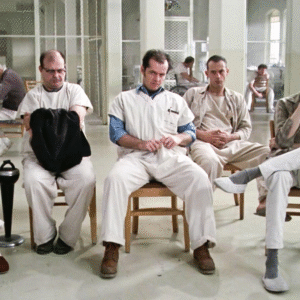Pola, 17, and Sonia, 16, analyse the strengths and weaknesses of Miloš Forman’s iconic movie


Jack Nicholson in 'One Flew over the Cuckoo's Nest' (1975), directed by Miloš Forman.
Picture by: LANDMARK MEDIA | Alamy
Article link copied.
21 November 2025
One Flew Over the Cuckoo’s Nest at 50: Has this film aged too well?
At a psychiatric ward ruled by an all-powerful nurse, Mildred Ratched, only one dared to laugh – Randle McMurphy rebelled against the system and challenged the control and order. Other patients, who remained subordinate to Ratched’s rule, soon turned out to be eager to explore the freedom offered by McMurphy.
One Flew Over the Cuckoo’s Nest (1975), directed by Miloš Forman, is based on Ken Kesey’s 1962 novel of the same name. The film stars Jack Nicholson as Randle McMurphy, a criminal turned rebellious new patient, who challenges the authority of the strict and manipulative Nurse Ratched, portrayed by Oscar-winning actress Louise Fletcher.
This year marks the 50th anniversary of this movie. Thousands of people decided to visit the cinemas around the world and rewatch the masterpiece. With one of the higher ratings – 4.4 (out of 5) on Letterboxd – what actually makes this movie so desirable?
Harbingers’ Weekly Brief
During the 1960s and 1970s, with the rise and collapse of the hippie movement, the debate on societal constraints was in full swing, and One Flew over the Cuckoo’s Nest addressed topics of freedom and individuality. The production’s realisation, with Jack Nicholson’s top-notch acting as the cherry on the top, turned the film into one of only three films in history that have won the “Big Five” Oscars (Best Picture, Director, Actor, Actress and Screenplay).
The movie scrutinises the subjugation of an individual by a higher authority. The staff of the mental hospital are extremely controlling and manipulative, their objective is to have the patients frightened, unable to express their opinions. Patients dislike the system, and its ways of dealing with those in need of help, but they lack the strength to resist, to expose that the “health and support institution” is only a facade.
Although five decades have passed since the film was released, the issue of excessive control, society’s inability to differentiate what’s acceptable in processes of socialisation or resocialisation, remains topical in the 2020s.
A psychiatric hospital is a type of an institution that American sociologist Erving Goffman has described as a total institution: a setting where every aspect of an individual’s life is controlled. People in total institutions – hospitals, prisons, convents and others – are cut away from wider society, and managed by a single authority.
This concept was the foundation of the conflict in One Flew Over the Cuckoo’s Nest: the power held by the staff, specifically Nurse Ratched, was used as a tool to change patients, shape their way of thinking, manipulate their personalities, so that they would, perhaps, one day, become “suitable” for the wider community and therefore be released.
Meanwhile, the patients were obliged to follow the rules of the institution, with sleeping hours, television and radio time, medicine, therapy sessions – everything – outside of their control. The hospital must be calm and organised, which Nurse Ratched supervises from her glass-covered office in the very centre of the hospital, symbolising the strength of her ubiquitous authority. Every behaviour that is considered disruptive is prevented, even the most rudimentary ones – such as expressing an opinion.
The film enjoyed such a massive success because Miloš Forman, using the metaphor of the mental institution run by Nurse Ratched, attempted to draw attention to how American society – and, more broadly, all Western societies – make difficult judgements between allowing freedom and enforcing constraints.
It is no accident that the producers entrusted directing the film to Forman, who had fled his homeland, communist-ruled Czechoslovakia, in 1968 after the Prague Spring rebellionwas ended by Moscow. Forman, one of the most prominent directors of the Czechoslovak New Wave, made films that satirised the authoritarian regime at home – something that allowed him to bring a deep understanding of a controlling system. He did not lose his grasp on the topic when working on the adaptation of Ken Kesey’s novel.
With this perspective, it’s easy to see that the film depicts how a higher authority tries to exercise its power over individuals under the impression of ‘helping’, ‘supporting’ or ‘educating’. One Flew Over the Cuckoo’s Nest appears here in the most distinguished company – novels such as Nineteen Eighty-Four or Brave New World.
Only when treated as a metaphor of the constant battle between freedom and authority, and not a depiction of the reality or the role of psychiatric hospitals and other total institutions in modern societies – the film reveals its critical potential, asking questions that are relevant in every society and every time: how is order maintained without trampling individuality?
How are those in power using institutions of education or coercion to change people to their liking? To what extent are the features of a total institution present in contemporary systems of power?
Let’s look at one of our closest environments: the school. Students are restricted, a firm hierarchy is present. We are to obey the rules and follow the word of a higher authority, our behaviour and opinions are shaped by what we are told at school. Rebellion will be squished. At every school, every day brings decisions that are discussed in One Flew Over the Cuckoo’s Nest – which is why this film made, and still makes, such a strong impact.
The film attempted to be a metaphor for all rebellion, against all types of overreaching authority, and strongly emphasised the value of every person’s individuality.
A vital aspect is how Forman portrayed mentally ill people – he established each character as a human being, not as someone defined by a disorder. In the 1970s, this was far from obvious, and even nowadays people often imagine life in a mental institution as one of isolation, where inhumane conditions are imposed to tame ‘the mad’ and control ‘the madness’.
Forman attempted to turn that around. Patients in the hospital formed their own little society, with each of them having their own characteristics and roles that they lived by. Mute Chief Bromden or stuttering Billy Bibbit were fully realised individuals that the audience could get emotionally attached to – as people, not as an illness. While it is difficult for them to resist the oppressive Nurse Ratched, they try to do so, in ways they can, even with severe consequences, such as those for Max Taber, or even the main character McMurphy.
Yet, there is one perspective that should be taken into consideration when rewatching One Flew Over the Cuckoo’s Nest 50 years after it was released – its portrayal of mental health institutions has massively contributed to how this critically important area of healthcare is perceived in Western societies.
It’s critical to remember that not only has almost everything changed in our approach to mental health between the 1970s and today, but also that in the ’70s this portrayal of the personnel of mental hospitals was deeply unfair.
The importance of mental health support has never been greater than today. According to a 2023 study in The Lancet, which surveyed more than 150,000 people in 29 countries, about 30% of people will have a mental disorder before reaching the age of 20. It concluded: “By age 75 years, approximately half the population can expect to develop one or more of the 13 mental disorders considered.”
Many of us will have to rely on nurses and doctors to get better, and it’s better that we don’t approach them with Nurse Ratched in our minds – she was merely a portrayal of abusive power.
Written by:

Writer
HRB Film & Book Club
Warsaw, Poland
Born in 2008, Pola writes to address important issues and inspire change. She believes in the impact of thoughtful, informed writing to shape conversations and influence perspectives.
Pola’s main academic interests are law, business, and politics. When not studying, she enjoys tennis, hiking, exploring the world through travel, and immersing herself in music, arts and architecture for creative inspiration.

Writer
HRB Film & Book Club
Warsaw, Poland
Born in 2009 in Warsaw, Poland, Sonia joined Harbinger’s Magazine to explore the current political situation.
In her free time, she enjoys reading classic literature, watching films, playing tennis, climbing and swimming. She is also interested in travelling and developing her sense of fashion.
In the future, she plans to study psychology, management, or international Relations to learn more about people’s behaviours and characters.

This article is a part of Harbingers’ Film & Book Club, an initiative of 18 students from 2SLO in Warsaw, Poland.
Edited by:

🌍 Join the World's Youngest Newsroom—Create a Free Account
Sign up to save your favourite articles, get personalised recommendations, and stay informed about stories that Gen Z worldwide actually care about. Plus, subscribe to our newsletter for the latest stories delivered straight to your inbox. 📲
© 2026 The Oxford School for the Future



